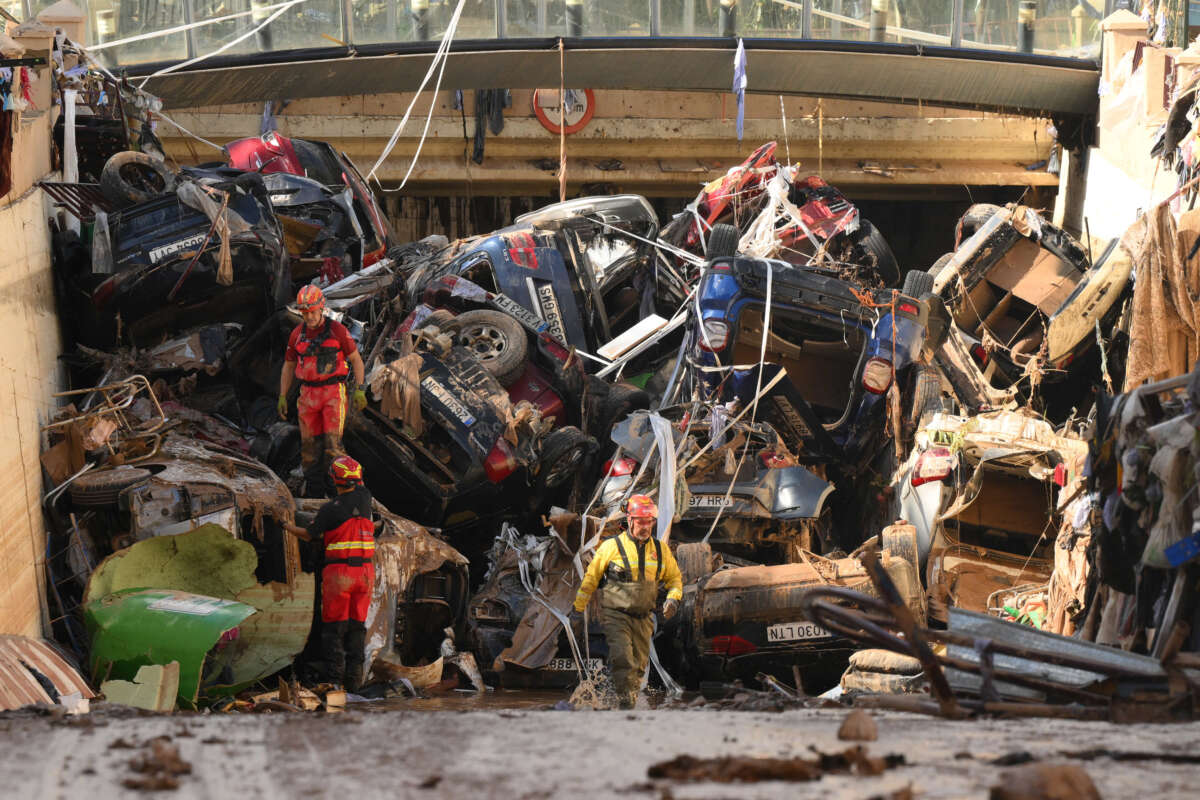Did you know that Truthout is a nonprofit and independently funded by readers like you? If you value what we do, please support our work with a donation.
More than 200 people have died due to intense flooding in and near the Valencia region of Spain, with right-wing provincial officials receiving criticism for having failed to provide enough warning to residents amid catastrophic rains that scientists say were made more likely due to the climate crisis.
As of Friday, 202 deaths were counted in the Valencia region, while three deaths were counted in Castilla-La Mancha. Dozens remain missing.
Descriptions of the flooding are harrowing — cars were swept away in many parts of the region, piling on top of each other where the floodwaters took them. On Thursday, after the rains had subsided, undertakers and funeral vans could be seen retrieving bodies from the streets. Some areas of eastern Spain received a year’s worth of rainfall in just eight hours.
“We all know someone who has died. It’s a nightmare,” said pharmacist Miguel Guerrilla, speaking to the BBC about the disaster.
A weather system known as a DANA — where cold air in the atmosphere meets the warm waters of the Mediterranean Sea — resulted in intense rainfall on Tuesday. DANAs have become more frequent in recent years due to higher sea surface temperatures resulting from climate change.
An initial analysis of the storm by World Weather Attribution, an international organization of climate scientists, suggests that the rains were made 12 percent heavier due to the effects of the climate crisis, and that human-caused climate change doubled the likelihood of a storm of that intensity. Other analyses of the DANA that hit the eastern part of Spain indicate that it was one of the most intense storms of that type over the past century.
Critics are also lambasting Valencia’s right-wing provincial leaders for their callous and ineffective response to the storm, noting that an earlier warning from officials could have saved lives. Indeed, Carlos Mazón, president of the Valencian Government, had indicated early on Tuesday that the rain hitting the region would subside rather than intensify.
“There is no evidence of personal damage but there is evidence of trapped vehicles. As the reservoirs are below capacity, they accumulate water without problems. There is no hydrological alert, which is good news,” read a translation of a post he made on X, which has since been deleted.
Even though AEMET, Spain’s state-based meteorological agency, had warned of “intense, extensive and persistent rainfall” earlier in the week and had raised its threat assessment of the storm to its highest level on Tuesday morning, many businesses and government offices still required employees to come into work. Valencia’s government offices only allowed workers to leave around 2 pm, well after the rainfall had begun.
Around 800 workers were trapped at an industrial park, for example, where flood waters ran so high that many had to climb onto roofs to avoid dangerous conditions. Many of those workers called loved ones, believing that they were going to die in the flood.
While no one died at that particular industrial park, at least six residents of a public-run nursing home died. Residents of that nursing home were seen in some images wading through the building amid rising floodwaters.
Notably, a civil protection alert in Valencia wasn’t sent out to cell phones until Tuesday at 8:15 pm. By then, hundreds of residents were already trapped by the floodwaters that had hit the region. Mazón also waited until 8:30 pm to request assistance from the national military, and initially resisted calling a state of emergency, as it would have required allowing the central, more progressive government to have authority over the region during the disaster.
“If the Valencian government had activated and communicated the alert — which inevitably reaches every citizen in possession of a cell phone — earlier, there would probably have been fewer deaths,” said former minister Alberto Garzón.
“Many of those who have died or have been injured were working at the time. [We] denounce the continuation of work when the risk of flooding was already known,” read a statement from Comisiones Obreras, Spain’s largest union, responding to the disaster and death toll.
A terrifying moment. We appeal for your support.
In the last weeks, we have witnessed an authoritarian assault on communities in Minnesota and across the nation.
The need for truthful, grassroots reporting is urgent at this cataclysmic historical moment. Yet, Trump-aligned billionaires and other allies have taken over many legacy media outlets — the culmination of a decades-long campaign to place control of the narrative into the hands of the political right.
We refuse to let Trump’s blatant propaganda machine go unchecked. Untethered to corporate ownership or advertisers, Truthout remains fearless in our reporting and our determination to use journalism as a tool for justice.
But we need your help just to fund our basic expenses. Over 80 percent of Truthout’s funding comes from small individual donations from our community of readers, and over a third of our total budget is supported by recurring monthly donors.
Truthout has launched a fundraiser to add 379 new monthly donors in the next 6 days. Whether you can make a small monthly donation or a larger one-time gift, Truthout only works with your support.
